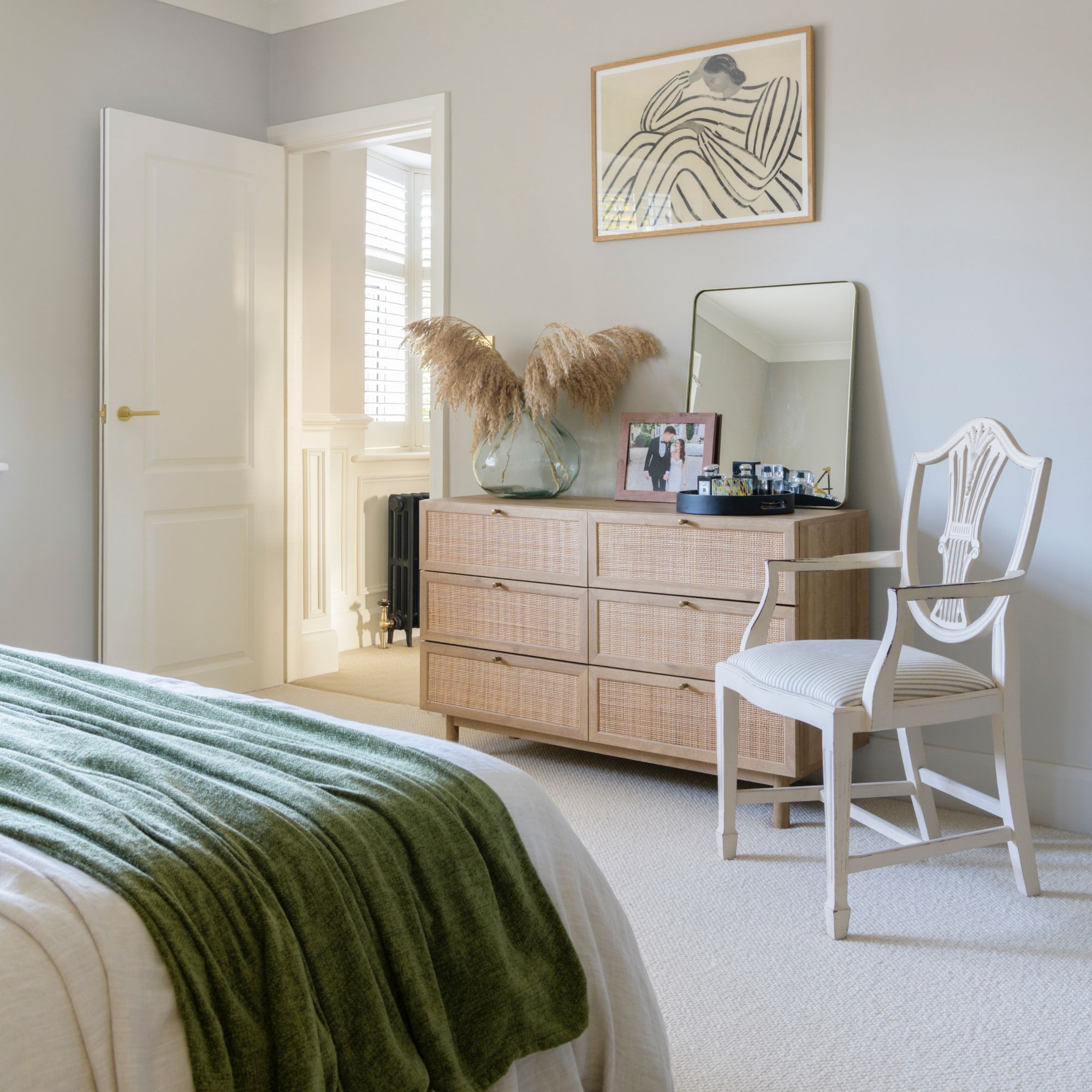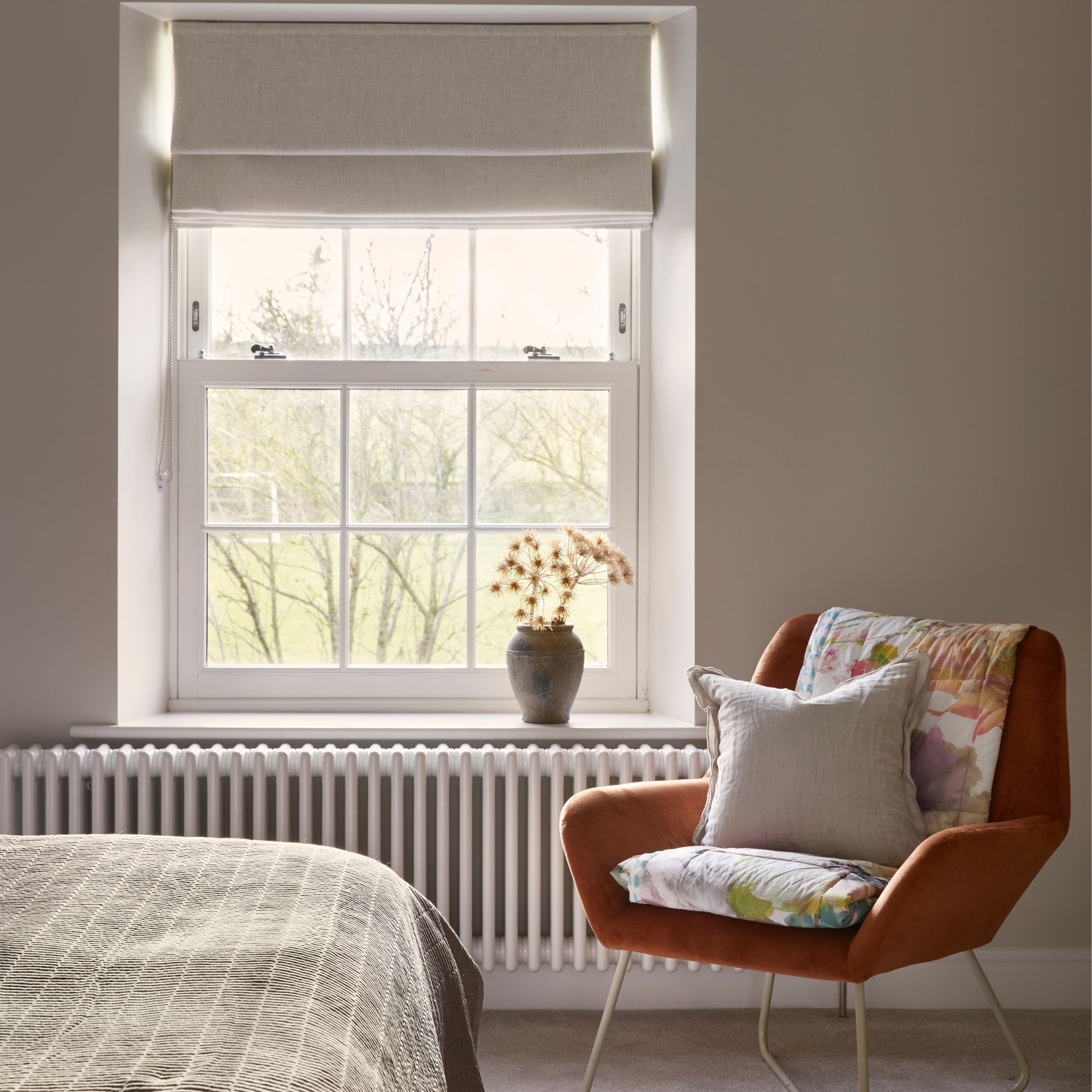
Waking up to wet, misted windows in the morning is a sure sign that winter is coming. But aside from ruining your view, untreated condensation can also lead to mould growth and serious damp issues. So, it’s essential you know how to stop condensation on bedroom windows.
As most of us spend at least eight hours a day in our bedrooms, creating a safe and healthy environment for sleep is key. And while most people focus on getting rid of condensation on walls and ceilings, it’s important to understand that our bedtime habits can also affect our windows. In fact, every breath we take at night releases water vapour, which ultimately settles on our bedroom panes, frames and sills.
Of course, prevention is always better than the cure. And while wiping condensation off windows does play its part in stopping damp in a bedroom, preventing the condensation in the first place will make the biggest impact. Because of this, we reached out to experts for their seven top tips to stop condensation on bedroom windows.
1. Keep your curtains open

No bedroom would be complete without curtains. And while there are so many bedroom curtain ideas out there, what you might not realise is that curtains can ultimately make condensation on bedroom windows worse.
Mark Carter, Director of California Shutters explains, ‘When we draw our curtains over a radiator, the heat generated is absorbed by the nearest cold surface - usually the window - effectively warming up the glass instead of our rooms.’
Because of this, choosing to keep your curtains open at night can make a big difference and stop condensation on bedroom windows. Of course, we understand that some people need complete darkness to fall asleep - so there are a few alternatives to consider if you don’t want to keep your curtains open.
Mark says, ‘By simply tucking the curtains behind the radiator or leaving them on the windowsill, the heat from the radiator can properly circulate throughout the room. At the same time, the curtains are also acting as a barrier preventing heat from escaping through windows.’
If you need something to keep your curtains away from your radiator, these holdbacks will do the trick. They also come in five colourways, so you can find one that suits your bedroom.
2. Install trickle vents

Ventilation is key to a condensation-free bedroom, and while experts urge you to open your windows for 15 minutes every day (yes, even in winter), it’s also important to ensure your windows are up to scratch.
Tom Swallow, sales director for Quickslide, says, ‘During the winter months, you are more likely to be sleeping with the windows shut, cutting off the essential ventilation required to allow the hot, humid air to escape. Modern windows today need to be fitted with a trickle vent – a narrow opening integrated into the framework of the window, which allows for ventilation even when the windows are closed. ‘
He adds, ‘This means that you can enjoy all the benefits of a thermally efficient window creating a warm and cosy room while allowing for a healthy flow of air which can help to prevent condensation.’
If your older windows don’t have trickle vents, you can install them yourself. However, you will need precise measurements and the confidence to drill into your windows, so you might want to consult a professional rather than do it yourself.
This pack of five trickle vents includes both internal and external parts and fixings, plus a handy install guide so you don't make any mistakes.
3. Reduce the humidity levels

Ultimately, condensation on bedroom windows is caused by excess moisture in the air - which takes the humidity level above what the humidity in a room should be. And while there are ways to dry a room without a dehumidifier, most experts agree that the best dehumidifiers are right for the job.
Chris Michael, Managing Director of Meaco, says, ‘Reducing the humidity level in your bedroom can help you to sleep better at night and allow you to wake up without condensation on your windows. A bedroom dehumidifier can work during the day and during the night, helping you to maintain a humidity level that works for you.’
We have created a whole guide on how to choose the best dehumidifier for a bedroom in terms of noise and size, but Chris also adds, ‘A good quality unit can shut off automatically when the room reaches a target humidity level, so you can be confident that your room is always going to be comfortable to sleep in.’
It’s perfectly safe to leave a dehumidifier running overnight, but if you’re a light sleeper and worried about the noise, you could also opt for a non-electric dehumidifier or moisture absorber instead.
4. Sleep with the bedroom door open

If you have a big family, shutting your bedroom door is just part and parcel of everyday life. But if you keep waking up to condensation on your bedroom windows, you might have to rethink this decision.
Helen Godsiff, Brand Manager at home improvement specialists Eurocell, says, ‘To help prevent condensation buildup occurring in the first place, it's important to ensure proper ventilation and ensure there is good air circulation around the room. The easiest way to do this is to sleep with the bedroom door open, allowing air to circulate around the room.’
After all, closing your bedroom door essentially traps excess moisture in your room, which will settle on your windows as condensation.
But you don’t have to keep your door wide open. If you still value your privacy (and the peace and quiet away from your kids), you can just leave it ajar.
If you have a tricky door that doesn't want to stay open or just want to make a feature out of keeping your door open at night, this doorstop is soft, plush, and stylish.
5. Keep your windows clean

There’s a high chance that you clean your windows for aesthetic reasons, as we all hate to see smears and streaks. But one thing you might not know is that this can also stop condensation on bedroom windows.
Laurie Crookes, buyer at Homebase, explains, ‘Regularly cleaning window frames and sills is important, as dust and dirt can retain moisture.’ Yes, the dirtier your windows are, the more moisture they’ll be able to maintain - making your bedroom window condensation worse.
Because of this, it’s well worth using the best window cleaning tools to get this job done in a jiffy. While you’re focusing on your windows, Laurie also suggests to, ‘Check for draughts around your windows and use weatherstripping or caulk to seal any gaps, preventing cold air from entering and contributing to condensation.’
I have this window vacuum myself, and I use it for everything from sucking up the condensation on my windows to cleaning them. I really wouldn't be without it.
6. Maintain a constant temperature

Condensation on bedroom windows is often worse during the winter months due to the different temperatures inside and outside your home. So, keeping the temperature constant can stop condensation from forming on your bedroom windows.
Nicholas Auckland, from Trade Radiators, advises, ‘I recommend keeping the temperature inside your bedroom at a consistent level. When your bedroom has a higher internal temperature, it helps to prevent cold surfaces. This will prevent water vapour landing on the surface of your windows and forming condensation. A thermostat can be helpful in ensuring that your heating remains at the same level from day to night.’
And if you want to have complete control of your heating while you’re in bed, you can also make the most of smart heating systems. Then, you can turn the temperature up or down on your phone.
To stop condensation in your bedroom, you can use this smart heating system to set up to six daily heating schedules and heating alerts when you leave or return home.
7. Close the en-suite door

If you have an en-suite bathroom - or your bathroom is right next door to your bedroom - you probably already know that the steam from this room can wreak havoc in your sleeping space. And as the main aim when trying to stop condensation on bedroom windows is to keep excess moisture to a minimum, this is something you need to address.
‘Bedrooms with ensuite bathrooms are also more prone to morning condensation,’ explains Tom from Quickslide. ‘By their very nature, bathrooms get very hot and humid in comparison to the bedroom, even if that bedroom is heated. If the bathroom door is left open, the hot, humid air will escape and make a beeline for the windows, where it will settle and turn to condensation.’
So, focus on keeping your bathroom door shut and weigh up the pros and cons of a dehumidifier vs bathroom fan to choose which option is right for your home.
If you want a helping hand to reduce condensation in the bathroom, this moisture absorber has got your back. Plus, you can move it into the bedroom if you need to.
FAQs
Does putting fairy liquid on windows stop condensation?
The washing up liquid window condensation hack has been proven to effectively prevent condensation on windows - and we’ve even tested it ourselves. In fact, the fairy liquid creates a barrier between the condensation and the window and stops the water from settling on the surface.
However, it doesn’t stop condensation completely, as the moisture in your room will simply find somewhere else to settle. Alongside this, window manufacturers don’t advise using this hack as it may damage the seals. In extreme cases, putting fairy liquid on your windows could even worsen the condensation and promote mould growth.
It's best to focus on understanding why there’s condensation in the first place and tackle that instead.
What is the cheapest homemade moisture absorber?
If you don’t want to buy a dehumidifier or non-electric moisture absorber, you can try making some homemade ones instead. In fact, some people find that placing a bowl of salt or baking powder on their windowsill is enough to catch the moisture and prevent condensation.
Just remember that these homemade moisture absorbers won’t last forever and will need replacing every few days if you want them to remain effective.







